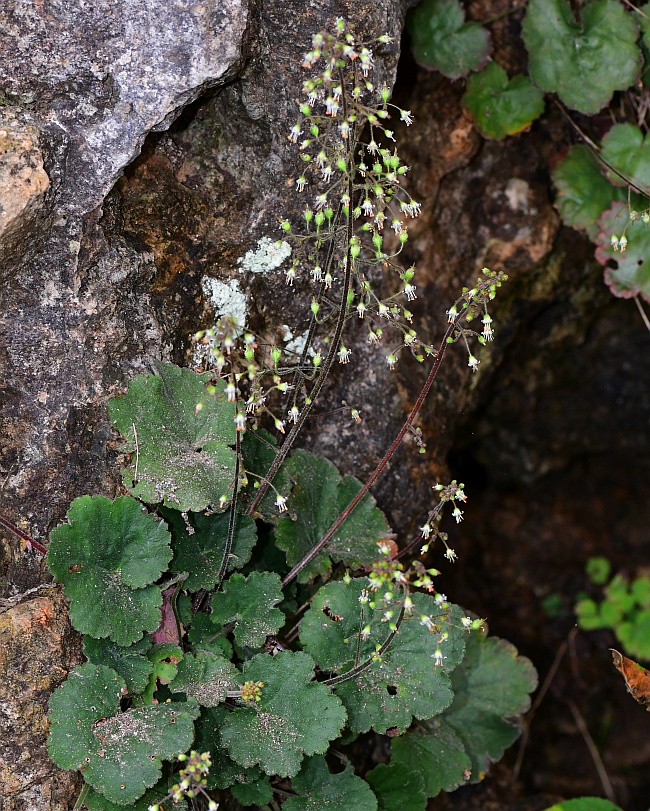Heuchera parviflora Bartl.
Small-flowered Alum Root

Native
CC = 10
CW = 5
MOC = 15
© SRTurner
Heuchera parviflora Bartl.Small-flowered Alum Root | |
 |
Native CC = 10 CW = 5 MOC = 15 |
© SRTurner |
|
Family - Saxifragaceae Habit - Rhizomatous perennail forb. Stems - Aerial stems absent. Leaves - Basal, petiolate. Petioles sparsely to densely pubescent with minute glandular hairs, sometimes also with sparse to dense longer spreading hairs having minute glandular tips. Leaf blades 2-13 cm long, circular to kidney-shaped, the surfaces glabrous or sparsely to moderately hairy and sometimes also minutely glandular-hairy, the lobes rounded, the margins scalloped or toothed.
Inflorescences - Panicles 9-45 cm long, with numerous flowers, ascending to pendant or spreading, the axes sparsely to densely pubescent with minute glandular hairs, sometimes also with sparse to dense longer spreading hairs having minute glandular tips.
Flowers - Hypanthium at flowering 1.3-3.5 mm long, 1-2 mm in diameter, the free portion 0.1-0.3 mm long, appearing actinomorphic or very slightly zygomorphic, obconic to somewhat bell-shaped when fresh, glabrous or minutely glandular on the outer surface, green to yellowish green, rarely reddish-tinged. Sepals 0.5-1.5 mm long, glabrous or minutely glandular on the outer surface and margins, the sinuses between the sepals relatively narrow. Petals 1.5-3.5 mm long, oblanceolate, glabrous, white, rarely pinkish-tinged.
Fruits - Capsules 2.8-5.5 mm long, tapered into the 1.5-4.0 mm long styles. Seeds 0.4-0.6 mm long, ellipsoid-ovoid, the surface smooth. Flowering - July - November. Habitat - Bluffs and rock outcrops, mostly on limestone or dolomite substrates. Origin - Native to the U.S. Lookalikes - Other species of Heuchera. Other info. - This late bloomer is somewhat uncommon in Missouri, more or less restricted to the southernmost quarter of the state. Beyond Missouri its range includes a dozen or so states, mostly in the Midwest. Its membership in the Heuchera genus is evident from the inflorescences of many flowers arising out of a set of basal leaves. The leaves are nearly circular, with scalloping and rounded lobes on the edges. The flowers are quite small. Where it grows, the plant can be abundant, but its obligate habitat of moist calcareous rock faces severely limits its distribution. Photographs taken at Alley Spring, Shannon County, MO, 9-16-2024 (SRTurner). |